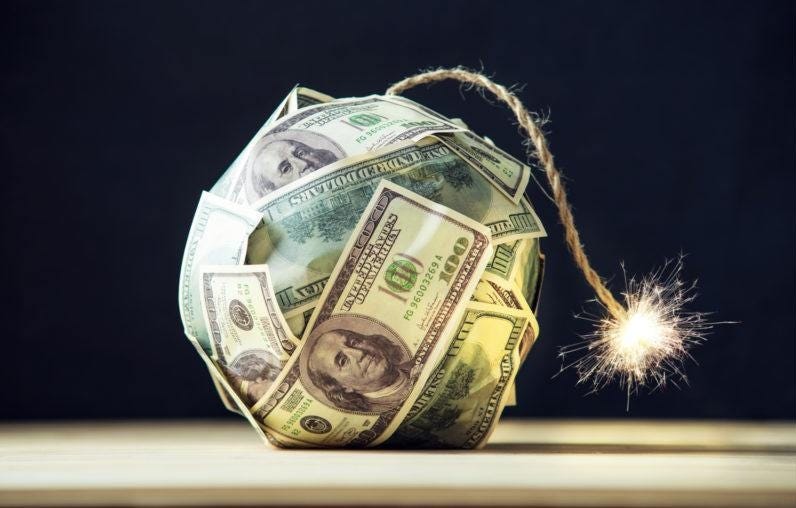Inflation is often spoken of as a harmless side effect of economic growth. A few percentage points a year, we are told, is not only normal but desirable. Yet for millions of people, inflation is a slow and silent thief, eroding purchasing power, distorting incentives, and punishing those who try to save for the future.
Its effects are rarely felt all at once, which is precisely why it is so dangerous. Inflation creeps into every corner of the economy, disguised by technical language and statistics that fail to capture its full human cost. For those living on fixed incomes, or trying to get ahead without access to assets, inflation is a quiet betrayal. Bitcoin offers a different path, one based on transparency, fairness, and mathematical certainty.
How inflation steals value
At its core, inflation is a decline in the value of money. When prices rise, each pound buys less than it did before. Wages may eventually adjust, but rarely in real time. This means that those without pricing power, ordinary workers, pensioners, savers—lose ground.
Consider this: if inflation is 5% annually, the value of £100 falls to £95 in just one year. After ten years, its purchasing power drops to around £60. This silent erosion of value disproportionately harms those who are unable to protect themselves through investments in assets like property or equities, which often rise alongside inflation.
Meanwhile, those who hold hard assets or access cheap credit—such as governments and large corporations, may even benefit from inflation, as it reduces the real value of their debts. This creates a system where the rules are skewed in favour of the asset-rich, while everyone else pays the price through a higher cost of living.
Shrinkflation: the hidden inflation
One of the most deceptive forms of inflation is shrinkflation—when the price of a product stays the same, but the quantity or quality quietly diminishes. A 200g bar of chocolate becomes 180g. A packet of biscuits loses a few members. A bottle of detergent is subtly watered down.
Because the price on the shelf appears unchanged, official inflation statistics often miss this entirely. Consumers, however, are forced to accept less for the same money, or pay more for the same amount. It’s inflation by stealth, and it’s everywhere—from cereal boxes to toilet rolls.
Shrinkflation distorts trust between producers and consumers. It erodes the real value of wages while giving the illusion of stability. And worst of all, it allows inflation to go politically unchallenged because it is difficult to measure and easy to conceal.
Why Central Banks create inflation
Most inflation does not appear by accident. It is the result of policy. Central banks around the world, including the Bank of England and the U.S. Federal Reserve, target a steady rate of inflation, typically 2%, on the basis that it encourages spending and investment.
This may benefit debt-laden governments and stimulate economic activity in the short term, but it punishes long-term savers and increases inequality. It also creates perverse incentives. In an inflationary environment, it becomes rational to borrow and spend rather than to save and invest cautiously. Financial prudence is penalised.
Bitcoin: a monetary alternative
Bitcoin offers a different kind of monetary system. Unlike fiat currencies, which can be printed at will, Bitcoin has a fixed supply of 21 million coins. This limit is hard-coded into the protocol and cannot be changed by any central authority.
Bitcoin’s monetary policy is not dictated by committees or political pressure. It is transparent, predictable, and enforced by a global network of decentralised computers. It cannot be inflated, cannot be devalued by decree, and does not favour the powerful over the powerless.
In a world where currencies are routinely debased and prices quietly manipulated, Bitcoin represents a form of monetary honesty. It restores the link between effort and value, between savings and reward.
What this means for the future
Inflation, shrinkflation, and currency debasement are not abstract economic terms, they are daily realities for millions. Over time, they distort economies and damage trust in institutions. While Bitcoin is not a magic solution to every economic problem, it does provide a much-needed alternative.
As more individuals and institutions recognise the risks of inflationary monetary policy, Bitcoin’s value proposition becomes clearer. It is not just an asset, but a protest, a vote for a system where money cannot be quietly stolen through policy.
The choice is not between perfect and imperfect. It is between a system where money is manipulated for political ends, and one where the rules are known and fair for everyone. For many, that is a choice worth making.


